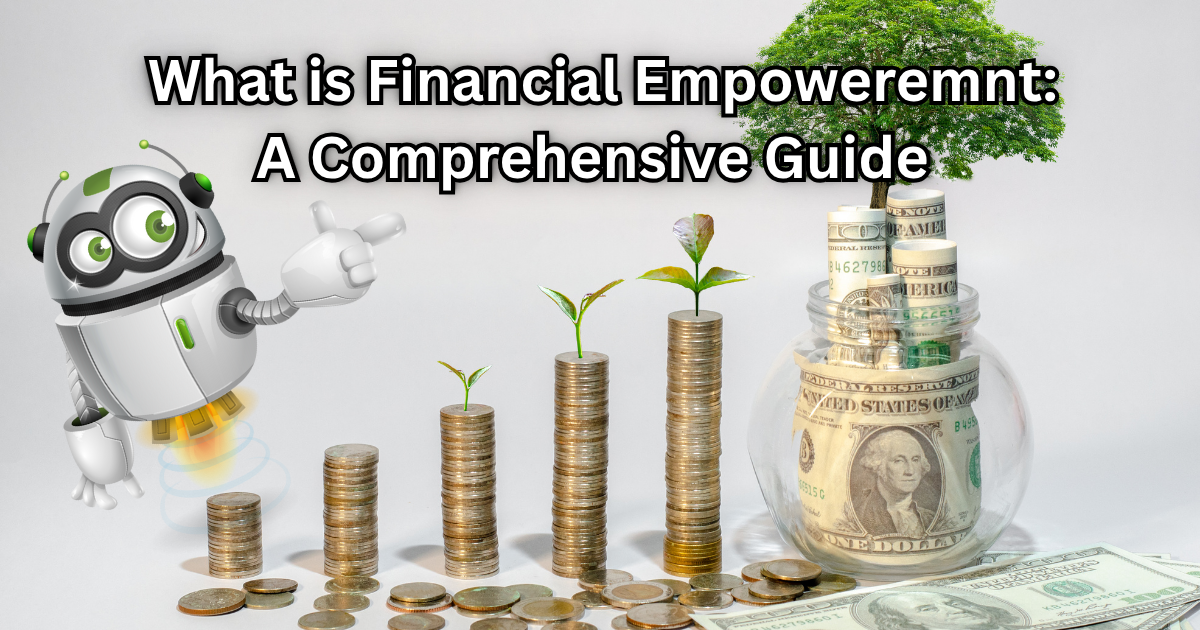What is Financial Empowerment

What is Financial Empowerment? Unlocking Financial Empowerment: A Comprehensive Guide to Taking Control of Your Finances
In a world where financial challenges can feel overwhelming, the journey to financial empowerment often seems daunting. However, taking control of your finances is not just a dream; it's an achievable goal that can transform your life. "What is Financial Empowerment?" This comprehensive guide will illuminate the pathways to mastering your money, from budgeting essentials to investment strategies, and everything in between.
Imagine a future where you're not just surviving paycheck to paycheck but thriving with confidence and clarity in your financial decisions. You'll discover practical tips, tools, and insights designed to equip you with the knowledge needed to unlock your financial potential. Whether you're just starting or looking to refine your financial strategy, this guide serves as your roadmap to financial independence. Join us as we explore effective methods to build a secure financial future and unleash the empowered individual within you. Your journey to financial freedom starts here!
Understanding Financial Empowerment
Financial empowerment is more than just having money; it's about having the knowledge, skills, and confidence to make informed decisions about your financial resources. It means taking control of your financial destiny and not being at the mercy of economic fluctuations or unforeseen expenses. Financial empowerment enables you to navigate life's financial complexities with a sense of security and peace of mind.
At its core, financial empowerment is about freedom – the freedom to choose how you live your life without the constant stress of financial instability. This involves cultivating a mindset where you view money as a tool to achieve your goals rather than a source of anxiety. Financially empowered individuals are proactive, not reactive, in managing their finances, and they understand that every financial decision has a long-term impact.
Achieving financial empowerment requires a commitment to continuous learning and improvement. As the financial landscape evolves, so too must your strategies and understanding. By staying informed and adaptable, you can ensure that your financial strategies remain effective and aligned with your goals. Whether through reading financial literature, attending workshops, or consulting with financial advisors, the journey to financial empowerment is an ongoing process of growth and education.
The Importance of Financial Literacy
Financial literacy is the foundation of financial empowerment. It involves understanding how money works, including concepts such as budgeting, saving, investing, and debt management. Without a solid grasp of these principles, it's challenging to make informed decisions that will benefit your financial health in the long run.
A lack of financial literacy can lead to poor financial decisions, such as accumulating excessive debt, failing to save for emergencies, or making unwise investments. These mistakes can have lasting repercussions, affecting your ability to achieve financial stability and security. Conversely, a high level of financial literacy equips you with the tools needed to navigate the financial world confidently and make decisions that enhance your financial well-being.
Financial literacy is not typically taught in schools, meaning many people enter adulthood without a clear understanding of how to manage their finances effectively. This gap underscores the importance of seeking out financial education independently. There are numerous resources available, from books and online courses to financial advisors and community workshops, that can help you build the knowledge necessary to take control of your financial future.
Assessing Your Current Financial Situation
Before you can take control of your finances, it's essential to understand your current financial situation. This involves a thorough assessment of your financial situation, including your income, expenses, debts, and assets. Having a clear picture of your financial health allows you to identify areas that need improvement and develop a plan to address them.
Start by listing all sources of income and tracking your monthly expenses. This will help you understand where your money is going and identify any unnecessary expenditures that can be reduced or eliminated. Additionally, take stock of your debts, including credit cards, loans, and mortgages, and calculate your total outstanding balance. Knowing how much you owe and to whom is crucial for developing an effective debt repayment strategy.
It's also essential to evaluate your assets, such as savings accounts, investments, and property. Understanding the value of your assets can help you determine your net worth and provide a clearer picture of your overall financial health. This comprehensive assessment will serve as the foundation for setting realistic financial goals and creating a plan to achieve them.
Setting Financial Goals: Short-term vs. Long-term
Establishing clear financial goals is a critical step in taking control of your finances. These goals provide direction and motivation, helping you stay focused on what you want to achieve. It's essential to distinguish between short-term and long-term goals, as each requires distinct strategies and timelines.
Short-term financial goals are those you aim to achieve within a year or two. Examples include saving for a vacation, paying off a small debt, or building an emergency fund. These goals are usually more immediate and can often be accomplished with minor adjustments to your spending and saving habits. Setting and achieving short-term goals can also provide a sense of accomplishment and momentum as you work towards larger objectives.
Long-term financial goals, on the other hand, are those that may take several years or even decades to achieve. These include saving for retirement, purchasing a home, or funding a child's education. Long-term goals often require more substantial financial planning and disciplined saving and investing. By breaking down these larger goals into smaller, manageable steps, you can make steady progress without feeling overwhelmed.
Creating a Personal Budget: Steps and Tools
A personal budget is a vital tool for managing your finances effectively. It helps you track your income and expenses, ensuring that you live within your means and allocate funds towards your financial goals. Creating a budget involves several key steps and can be made easier with the use of various tools and apps.
The first step in creating a budget is to list all sources of income, including your salary, bonuses, freelance work, and any other earnings. Next, track your monthly expenses, categorizing them into fixed costs (such as rent or mortgage payments, utilities, and insurance) and variable costs (such as groceries, entertainment, and clothing). This will give you a clear picture of where your money is going each month.
Once you have a complete list of your income and expenses, compare the two to determine if you are living within your means or spending more than you earn. If you find that your expenses exceed your income, consider identifying areas where you can reduce spending. This may involve reducing discretionary spending, finding more affordable alternatives, or eliminating unnecessary costs. There are numerous budgeting tools and apps available that can help you track your spending and stay on top of your finances. Popular options include Mint, YNAB (You Need A Budget), and PocketGuard.
Strategies for Reducing Debt
Debt can be a significant obstacle to financial empowerment, but with the right strategies, it's possible to reduce and eventually eliminate it. The first step in tackling debt is to understand the different types of debt you have and prioritize them based on interest rates and balances.
One effective strategy for reducing debt is the debt snowball method. This involves paying off your smallest debt first while making minimum payments on the others. Once the smallest debt is paid off, you move on to the next smallest, and so on. This approach can be motivating, as it allows you to see progress quickly and build momentum as you eliminate each debt.
Another strategy is the debt avalanche method, which prioritizes paying off debt with the highest interest rate first. This can save you more money in the long run, as you'll reduce the amount of interest you pay over time. Regardless of the method you choose, it's essential to remain committed and consistent in your efforts. Consider consolidating high-interest debts into a single, lower-interest loan or transferring balances to a credit card with a 0% introductory rate to make your repayment plan more manageable.
Building an Emergency Fund: Why It Matters
An emergency fund is a crucial component of financial stability and empowerment. It serves as a financial safety net, providing you with the resources needed to handle unexpected expenses, such as medical emergencies, car repairs, or job loss, without resorting to debt.
To build an emergency fund, start by setting a target amount. Financial experts typically recommend saving three to six months' worth of living expenses, but the exact amount will depend on your circumstances. Once you have a target in mind, create a plan to save consistently by setting aside a portion of your income each month.
Automating your savings can make the process easier and more effective. Set up automatic transfers from your checking account to a dedicated emergency fund account, ensuring that you consistently contribute to your savings without having to think about it. As your emergency fund grows, you'll gain peace of mind knowing that you have a financial cushion to fall back on in times of need.
Investing Basics: Growing Your Wealth
Investing is a powerful tool for building wealth and achieving long-term financial goals. While it may seem intimidating at first, understanding the basics can help you make informed decisions and grow your wealth over time.
There are various types of investments to consider, including stocks, bonds, mutual funds, and real estate. Each has its risks and rewards, and it's essential to diversify your investments to minimize risk. Diversification involves spreading your investments across different asset classes, industries, and geographic regions, reducing the impact of any single investment's poor performance on your overall portfolio.
Before you start investing, it's crucial to assess your risk tolerance and investment goals. Your risk tolerance refers to your ability and willingness to withstand market fluctuations and potential losses to pursue higher returns. Your investment goals will determine your investment strategy, including the types of investments you choose and the time horizon for your investments. By understanding these factors, you can develop a personalized investment plan that aligns with your financial objectives.
Resources for Ongoing Financial Education
Financial education is a lifelong journey, and staying informed is key to maintaining financial empowerment. Numerous resources are available to help you continue learning and improving your financial knowledge.
Books are an excellent starting point for building financial literacy. Some popular titles include "Rich Dad Poor Dad" by Robert Kiyosaki, "The Total Money Makeover" by Dave Ramsey, and "Your Money or Your Life" by Vicki Robin and Joe Dominguez. These books cover a range of topics, from budgeting and saving to investing and financial independence, providing valuable insights and practical advice.
Online courses and webinars are another great way to expand your financial knowledge. Websites such as Coursera, Udemy, and Khan Academy offer a range of courses on personal finance, investing, and money management. Many of these courses are free or low-cost, making them accessible to anyone looking to improve their financial skills. Additionally, financial blogs and podcasts can provide up-to-date information and expert advice on managing your finances, staying informed about market trends, and learning from seasoned professionals in the field.
Conclusion: Taking the First Steps Towards Financial Freedom
Embarking on the journey to financial empowerment may seem overwhelming, but taking the first steps can set you on the path to financial independence. Begin by evaluating your current financial situation and establishing clear, attainable goals. Create a personal budget to track your income and expenses, and develop strategies to reduce debt and build an emergency fund.
Investing in your financial education is crucial for long-term success. By continually expanding your knowledge and staying informed about financial trends and strategies, you can make informed decisions that will help you achieve your financial goals. Utilize the resources available to you, from books and online courses to financial advisors and community workshops.
Remember, financial empowerment is an ongoing process that requires dedication and commitment. By taking control of your finances and making informed decisions, you can build a secure financial future and unleash the empowered individual within you. Your journey to financial freedom starts now, and with the right tools and mindset, you can achieve the financial independence you desire.
The Road to Financial Empowerment Blog: The Road to Financial Empowerment Blog
Visit our YouTube channel and subscribe. The Road to Financial Empowerment
👇 Breaking Through Financial Barriers!
Empowering Your Finance is the most comprehensive financial empowerment platform, offering a wide range of financial education and planning resources.
Stay updated on the latest Business and Economic News, Empowering Your Finance.
"If you want to thrive in today's economy, you must challenge the status quo and get the financial education necessary to succeed" - Robert Kiyosaki.
If you found this breakdown on "What is Financial Empowerment?". Show your support by subscribing to The Road to Financial Empowerment newsletter for the latest information, resources, strategies, and tools in personal finance, and share this article with your network. Let's grow this community of informed investors together!"












